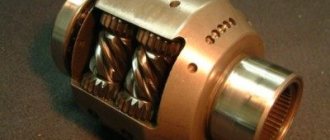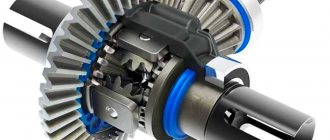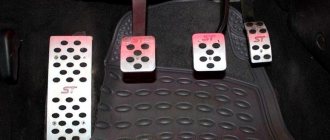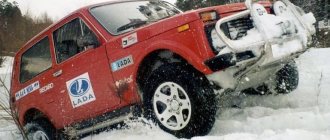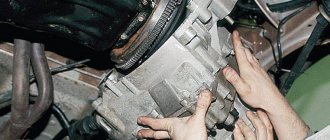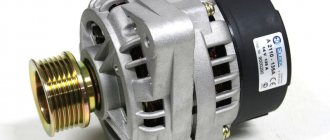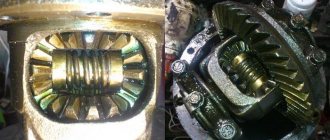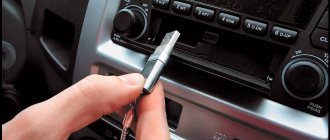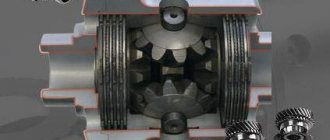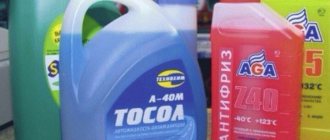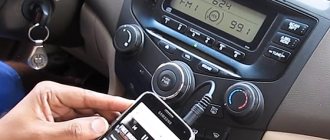After what I discovered with the previous gearbox, I decided to make a no-compromise design that would be able to handle the loads without falling apart.
So, the gearbox on our classic consists of a bunch of all sorts of high-tech pieces of hardware. For clarity, I provide a numbered photo with a description.
Attention!
This part contains instructions for disassembling and welding. Assembly, bearing replacement, adjustment, oil seal replacement and installation will be discussed in detail in the following parts.
I will answer any questions you may have right away.
♦ — Why is everything so clean? — I spent half an hour and 5 liters of gasoline cleaning the gearbox from oil. Before welding I used acetone (1 liter was enough and there was even some left).
♦ — Why the hell is this necessary? - Get out of here with such questions! =)
♦ — Will it work reliably? — In subsequent parts there will be statistics on the operation of a gearbox with a welded differential. I’ll say right away that I’ve already driven about 2000 km on it. Both in the city and outside the city, and bang and bang sideways.
♦ — What did you cook it with? — Semi-automatic, good and expensive, in an environment of 80% argon and 20% carbon dioxide.
♦ — What kind of oil did you fill with how much? — For hypoid gears, of course. 80W-90 or 75W-90 is what you need. You don’t have to take anything too expensive, the main thing is to buy something that’s not scorched. I filled up with Lukoil at 600 rubles/liter, almost two liters (more than needed, and there’s nothing wrong with that, especially considering the increased load)
♦ — How long did it take? — 14 hours, including removal, cleaning, disassembly, welding, replacement of all bearings, oil seal, assembly, gearbox adjustment and installation. This means smoking intermittently, eating something once, walking in circles, drinking beer after a test drive.
♦ — Are you satisfied with the result? - Satisfied.
So, the idea itself was to create an indestructible unit inside the gearbox. Because if the main couple falls apart, that’s her problem. But where 100% blocking is implemented through welding, failures should be excluded.
1 — Gearbox housing 2 — Just in case, I marked the flange that is attached to the bridge ;)) 3 — Yoke. They are made entirely with the body, and only then processed. Do not confuse places when disassembling and reassembling! 4 — Preload nut for planetary gear bearings assembled with differential 5 — Second yoke. I was too lazy to correct the photo ;)) 6 — One of the four bolts securing the yokes (two for each) 7 — Position lock for the preload nut of planetary gear bearings with a differential (aka “stopper”) 8 — Bolt for securing the retainer (stopper) of the preload nut… 9 — Bevel gear (driver) 10 — Planetary gear (driver) —————— The drive and driven gears together form the main pair. You cannot change just one of them separately, because they are matched to each other at the factory according to many parameters, such as the density and accuracy of the teeth, backlash, noise during operation, and a whole lot more. Among the most common names: Main pair, main gears, main gears, main gear, also known as “carrot and squash”, “cone and planetary gear”, “driver and driven”, “shank and plate”... And what not you will find on the Internet. —————— 11 — Differential housing 12 — Axle gear (the splines into which the axle shaft is inserted are marked) 13 — Satellite 14 — Axle of the satellites (the so-called pin)
! In photo No. 1, the planetary gear mounting bolts are NOT marked, but they are later in the photo report. Bearings (several types) are also not marked; of course, they are later in the photo report.
Photo No. 2.
What remains in the gearbox housing and why.
1 - gear housing 2 - bed, seat of the driven gear bearing and differential housing 3 - thread for the preload nut 4 - thread for the yoke mounting bolt 5 - bevel gear (drive) 6 - internal shank bearing 7 - lubrication channels
If your gearbox with an oil seal (on the side where the cardan is attached) is fine, it is not damaged, does not leak, before you decided to put the gearbox under welding, it did not leak, there were no traces of oil - here we do not touch anything and let's move on. If replacement is required, we will go into more detail later. For now, let's move on.
Differential lock and stability control
Forced differential locking with a hydraulic drive
In order for the torque of the axle shafts to become the same again, it is necessary to block the action of the satellites or ensure its transmission from the cup to the loaded axle shaft.
This is especially true for off-road vehicles with 4X4 all-wheel drive. Not only because they are designed for driving in areas with difficult road conditions. If a car equipped with three differentials (two interwheel, one center) loses grip at least at one of the four points, the torque of the remaining wheels will go to zero, and the car will refuse to move.
Locking helps to avoid troubles, which can be either partial or complete (depending on the degree of redistribution of forces between the axle shafts), as well as either manual or automatic (depending on the degree of control on the part of the driver).
They have proven themselves well, distributing torque, taking into account its difference on the axle shafts or based on the values of angular velocities.
The most complex and perfect way to eliminate the shortcomings of the unit is an electronic lock, implemented on the basis, the sensors of which monitor all the necessary parameters while the car is moving. Based on the data received, the vehicle’s operation is adjusted automatically.
Recent comments
- admin to the post differences between 8v and 16v controllers using the example of January 7.2 8v and Bosch 7.9.7 16v
- admin to post Useful information
- admin to post Atomic soft
- admin to the post Answered questions (comments) over the past months
- admin to the entry Pinout of the connection block SUD M7.9.7./January7.2 to the interior wiring of the Europanel (VAZ 2114)
- admin to the entry Chiptuning - About the table of monitoring stations and control centers (for dummies)
- admin to the post Answer to a question about Atomic Tune 2.8.8
- daser on Angel Eyes
- Kirill on the entry Pinout of the connection block SUD M7.9.7./January7.2 to the interior wiring of the Europanel (VAZ 2114)
- Anonymous to the post Answered questions (comments) in recent months
How to brew? Removing the differential from the car
So, let's get straight to work. To weld the differential, we need to take it out. Therefore, first we drive the car onto an overpass or inspection hole (if there is a lift, this is even better). Next you need to remove the oil from the gearbox. The usual “transmission” is poured here. But it’s not worth pouring “working out”. After you have received the welded differential, you need to fill the gearbox with new oil. Next you need to jack up the rear of the car. The wheels and brake drums are removed. Next, using a ratchet, unscrew the axle shaft on both sides and pull it out (not necessarily completely - you can pull it out by 20-30 centimeters). Next, unscrew the bolts around the circumference of the gearbox (usually there are eight of them), and remove it outward. Using a piece of clean rags and gasoline, we treat the gears of the mechanism. We need this for better “grip”.
Welding technology
So, before us is a bare gearbox with satellites. How to weld a differential with your own hands? Everything is very simple. Using a welding machine, we “grab” the satellites from the inside of the differential housing, as well as from each other. After this, you can apply a full suture. It looks like this.
To ensure the quality of the seam (if a semi-automatic machine is used), remove the slag deposits with a hammer and chisel. If the seam is uneven, process the contact area of the satellites again. Now you can put everything back together and put the gearbox in its place. The car is fully serviceable.
We weld the gearbox
What is gearbox welding? and why it is needed, we will understand in this article. In order to drift, you definitely need to weld your gearbox or buy a differential lock. but all this is needed so that both rear wheels slip together and not separately, which in turn will increase the controllability of the car in a skid, and it will also be easier to go into a skid since we will already have the power distributed equally to both wheels. Of course, the easiest and cheapest way is to weld your gearbox. To do this, you need to weld the gears of the gearbox together so that they no longer spin. For this, I am posting a video for you where everything is clearly shown and tells you what to weld to what, and how.
I hope after watching it you will understand how to weld your gearbox. After welding, your rear wheels will always spin at the same speed. At the same time, you may hear the tires squeaking when turning, do not be alarmed; this is a normal phenomenon. If you are not satisfied with this, buy yourself a lock and you will be happy, but I will say right away that it costs a lot, so think for yourself, if you have questions, ask us in the comments. Also read other interesting articles about how to build a cramp yourself on our website.
Changing the oil in the gearbox of VAZ 2101, 2106, 2107
11 comments to Weld the gearbox
Thanks for the article, your site is great, keep it up!
why not electric welding?
You can weld using any welding method, I welded mine using electric welding and everything was welded perfectly!
Greetings)) I would like to weld the gearbox) how and where can this be done?) the gearbox is on the car!)
Hello, you can do it in any garage with a pit or by lifting the back of the car so that you can pull out the drive and remove the gearbox.
Andrey Dyakov says:
They say that it’s better to upgrade a gearbox from a penny to a classic, is that true?
You won’t feel much of a difference, so I think you shouldn’t bother too much with it, just cook it as it is!
and in winter how to drive on the highway with boiled milk. If there are different surfaces under the wheels? Will the car not be thrown off the road?
Everything will be fine if you drive carefully and there will be no problems.
I wonder if the car behaves normally in normal turns? Since both wheels are spinning. It would be a shame not to go directly in winter, for example..)
Some people like it, some don’t like it...
One of the main problems of the Kansky Festival is the lack of support, and sometimes even obstruction of the festival from local authorities. Of course: what cultural department of a tiny town would like obscene and confused poems from the stage or an adult man in tights running up the stairs of the city youth center. That's right - none. A lot has happened over 18 years - art objects were burned, broken, participants were called names and kicked out many times, it got to the point that they threatened to move the festival to Moscow. But this year (remember, the mayor of Kansk changed not so long ago), it seems like the festival and the city sat down at the negotiating table.
Differential operation
The operation of the cross-axle differential is characterized by three modes:
- movement in a straight line;
- work in turns;
- in slippery road conditions.
When driving straight, the forces are distributed equally to each wheel, and the torque is transmitted through the body to the satellites. The satellites do not rotate on their axes; accordingly, the semi-axes rotate with equal angular velocities.
When turning, the differential begins to work, that is, to do the job for which it was created. The inner wheel begins to run along a smaller radius, and the outer wheel begins to run along a larger radius; the angular velocities on the side gears begin to change. The satellites begin to rotate around their axes, which increase the speed of the outer gear of the axle shaft running along the outer radius of the wheel and reduce the angular speed of the inner gear, axle shaft and wheel running along the inner radius.
The sums of the rotational speeds of the side gears always correspond to the rotational speed of the driven gear of the main drive. Therefore, when turning, the traction on the wheels is always the same and the inner wheel never slips, provided that the wheels have equal adhesion to the road.
If the car finds itself in slippery road conditions, then the wheel with less traction begins to slip and rotate faster, and the wheel with more traction simply stops rotating and, in fact, the car will simply stand still with one rotating wheel. This is the disadvantage of the differential, which is determined by its design.
It is possible to combat this phenomenon, and the designers came up with a differential lock. But more on that in another article.
Honest all-wheel drive is the key to high cross-country ability of a car or other equipment. But it is almost always implemented using center and cross-axle differentials, and crossovers generally use viscous couplings, which are not suitable for complete off-road use. The principle of operation of a differential is simplified as follows: torque is transmitted to where it is easier to turn the axle or wheel. This was done primarily to improve handling, especially in corners, when the wheels are forced to rotate at different angular speeds. But off-road, the presence of a differential contributes to a deterioration in cross-country ability due to the fact that the torque is transferred to the wheel that has the worst grip on the surface. And if the center differential often has the ability to lock, as on the same Niva, then the cross-axle differential rarely has such a useful function, with the exception, perhaps, of some expensive SUVs.
"Electric arc" differential lock
You can find self-locking and forced-locking differentials for almost any SUV on sale. Their design can be different, so the choice is quite varied, especially for mass-produced SUVs such as Niva, UAZ, Toyota Land Cruiser, Mitsubishi Pajero and others. But the cheapest and easiest way to lock any differential is to weld it. Simply using a welding machine we weld the pinion gears to the axle gears and get a permanently locked differential.
Electric arc differential lock
This approach is often used by drifting and off-road enthusiasts. The welded gearbox allows you to evenly distribute torque between the wheels, thereby significantly increasing the vehicle's cross-country ability. But there is also a downside: a blocked axle significantly impairs handling, so using such a car on public roads is dangerous.
NIVA CLUB
International Niva Club
- List of forumsAuto - EquipmentTechnical section Lada 4x4 NivaOff-road
- Search
- Links
- Unanswered topics
- Search
- Online store "NIVA SHOP"
Active topics
differential welding
differential welding
Post by rerp » 18 Feb 2011, 19:51
Re: differential welding
Post by MEW » 18 Feb 2011, 19:58
Re: differential welding
Post by rerp » 18 Feb 2011, 20:03
Re: differential welding
Post by Captain » 18 Feb 2011, 20:15
Re: differential welding
Post by MEW » 18 Feb 2011, 20:16
Re: differential welding
Post by rerp » 18 Feb 2011, 20:19
Re: differential welding
Post by Anton » 18 Feb 2011, 20:26
Re: differential welding
Post by MEW » 18 Feb 2011, 20:26
Re: differential welding
Post by MEW » 18 Feb 2011, 20:27
Re: differential welding
Post by Anton » 18 Feb 2011, 20:35
Re: differential welding
Post by rerp » 18 Feb 2011, 20:46
Re: differential welding
Post by Alex_P » 19 Feb 2011, 00:23
Re: differential welding
Post by rerp » 19 Feb 2011, 01:23
Re: differential welding
Post by Alex_P » 19 Feb 2011, 02:04
Re: differential welding
Post by romanvl » 19 Feb 2011, 05:51
don’t listen to anyone, listen to me) for a combat vehicle, welding the rear differential saves you 10 thousand rubles, shock loads are less, the wheels spin together, it works great in the forest. Again, at competitions or on rides, the main principle is to drive out into the mud, turn on the rear block and forget - the competition is over - turn off the block. The only thing is that the tires will eat up on the asphalt a little more than in normal mode. on soft surfaces - it won’t break anything! on the asphalt - you need to drive according to the condition of the car, personally I feel sorry for the tires, there is a kit for rolling to the point of failure and there is a combat kit for mud. but no one forces you to take turns at 150 km per hour? You can slowly drive 60-70 to the dirt, no consequences.
You can't brew it before. although for a specific shit climber it’s possible. It will go absolutely great.
my thoughts, everything IMHO. (self-blocks like Daka, when they get tired, also work haphazardly, in fact - the same welding, and does not break anything. Well, until one of the wheels gets stuck in the stones or between trees, for example))
DIY differential repair
What can you do on your own to fix this part? Several consistent recommendations will help you solve the problem.
Since it has already been said that the differential is located in the gearbox, therefore, for repairs this unit must be removed from it. To do this, read the article, which talks about how to remove the differential (step No. 30).
Differential diagram VAZ 2110
1. Take out the semi-axial gears, turning them around the axis of the satellites 90 degrees.
2. Before removing the satellites, you need to remove the retaining ring from their axis.
3. Now you can easily remove the axle and two satellites.
4. To release the driven gear, you need to unscrew the mounting bolts in the differential housing.
5. Remove the part from the body using a hammer and chisel.
6. Everything that has been disconnected: satellites, their axle, gear - carefully inspect for defects. If the surfaces of these parts, and the surface of the body itself, have irregularities or polyps, carefully remove them with fine-grained sandpaper.
Be prepared for the fact that some defects cannot be eliminated, which means you will have to buy a new part.
7
Pay special attention to the driven gear in the gearbox. Defects in this part may interfere with the normal operation of the differential.
If you find significant tooth wear, chipping or wear, the gear will have to be replaced.
Tip: Drive and driven gears are sold together (as a pair). Therefore, it is better to replace both at once. On the driven gear, the manufacturer must indicate the number of teeth of both the first and second gears. However, “trust, but verify,” says the proverb, and to check, it is better to count and check the number of teeth.
8. Check the suitability of the bearings. Their damage is indicated by pitting and indentation marks on the running tracks and rolling elements. Verdict: requires replacement.
Attention! To successfully repair and replace this VAZ 2110 and 2112 unit, you must purchase instructions, a diagram and a set of additional tools. If you do not have these 2 components at your disposal, it is best to entrust the repair to professionals in a car service center.
For adjustment and repair you will need:
- Set of socket wrenches (heads),
- Universal round nose pliers,
- Special version of pliers for removing the retaining ring system,
- Thin chisel
- An ordinary hammer.
Stages of repair.
The stages of work on adjusting and replacing the differential on the VAZ 2110 and 2112 are as follows:
First, dismantle the assembly itself directly from the gearbox. Turn the central axis of the satellites 90°, then use a socket wrench to remove the axial gear from the housing structure. Remove the retaining rings from the central axis of the satellites. Remove the axle itself and each of the two satellites from the metal case. Remove all secured bolts in the driven gear structure. Insert the chisel into the gap that appears between the inner race of the bearing and the end of the differential box. For convenience, you can press the driven gears from the metal body of the unit. Next, you need to inspect the working surface of the satellite set, the central axis, the semi-axial gear and the surfaces of the body itself in contact with them. Minor unevenness can be removed using fine-grained sandpaper. Parts on which you find significant defects must be replaced. It is imperative to check the gearbox driven gear. If chips, breaks, small chipping or significant wear of the teeth are detected, this gear must be replaced
Attention! At the factory, specialists select a set of gears for the main drive only in pairs according to the characteristics of the contact patch. That is why replacing the driven gear must be accompanied by replacing the drive gear. If faults are detected in the bearings, they must be replaced by first pressing them into the metal differential structure using a puller. All that remains is to press the outer set of rings from the gearbox housing and clutch using a special puller
If you do not have a puller, you must first press in a set of axle shaft seals, and from the outside, use a punch to remove the bearing rings themselves. When replacing all defective elements, all that remains is to assemble the VAZ 2110 and 2112 differential in the reverse order. Be sure to pre-lubricate each part with any brand of gear oil before installing it in the gearbox. The driven gears must be installed with the outside of the tooth markings facing up.
At this point, the stages of replacing and repairing the differential end. All that remains is to adjust and check the operation while driving around the car.
Eliminate vibration with additional fasteners
Vibration in the body is the main “disease” of the Niva; it often occurs due to improper alignment of the transfer case. Most often, vibration occurs on VAZ 21213/21214 cars, since the transfer case is mounted only on two supports on the sides of the body; on the Chevrolet Niva, the transfer case is already installed on three supports.
- driveshafts are poorly secured;
- wheels are not balanced;
- there is play in the cardan crosspieces (vibration is especially affected by play in the rear driveshaft crosspieces);
- The vibration comes from the engine itself.
Vibration when starting off on a Niva can also occur for the following reasons:
- the mounting supports of the transfer case have become loose;
- The rubber on the RK supports themselves broke.
Installing the third support of the transfer case on VAZ 21213/21214 vehicles allows you to reduce the level of vibration of the transfer case; with this support it is easier to center the transfer case. The part can be purchased at auto stores or made yourself. The finished product comes with three long studs (for model 2121); to install the third support on this machine, you will need to unscrew the short studs from the transfer case housing and install new studs from the kit. We carry out repairs as follows:
- dismantle the front passenger seat in the cabin;
- remove the floor tunnel lining;
- in the cabin we move aside the carpet covering the body amplifier (in front of the handbrake lever);
- remove the transfer case (alternatively, you can simply hang it up, but removing the third support makes it easier to install);
- We attach the bracket of the new support to the body of the RC;
- we install the transfer case in place, center it in the optimal position, and fasten the side supports;
- we combine the third support with the body, drill two holes in the bottom;
- Using washers, bolts and nuts (from the kit) we attach the support to the bottom of the body.
In order to install the subframe, the transfer case must be removed. It is more convenient to carry out such work in a pit; we carry out repairs as follows:
- leave the car in neutral gear;
- disconnect the propeller shaft from the transfer case, it is advisable to mark the driveshaft flange and the drive shaft so that during installation, align the driveshaft according to the marks - this way, the occurrence of unnecessary vibrations is eliminated;
- dismantle the muffler mounting bracket;
- remove the gearbox traverse;
- jack up the transfer case, remove the side fastenings of the transfer case;
- We treat the places where the subframe fits to the body with Movil;
- place the subframe on the gearbox studs;
- we mark the attachment points of the subframe on the side members, drill holes, attach bolts to the body;
- we tighten all fastenings, except for the transfer case supports themselves;
- we perform alignment of the steering wheel;
- Finally tighten the transfer case supports.
It should be noted that installing an additional support or subframe on the steering wheel does not always lead to the desired effect; in some cases, vibration only increases.
Nissan Skyline RB25DE+T NEO R34 › Logbook › Welded differential
This is a manifestation of collective farm tuning through the use of a welding machine, other than using obscenities, I cannot remember. Of course, most street racers will stubbornly declare that this is all full 2Way and that’s it, with such a differential only for drifting. This may be true, but driving with this collective farm every day is simply unrealistic. My opinion is that there is no money to supply LSD - don’t go there, for God’s sake. The car turns from a brainchild of engineering into a metal block with wheels that actively destroys rubber, does not want turn, and in the dampness or snow madly wants to send you to the next world. In general... after riding with this horror for 3 days, I set out to improve the situation and knock all the welding from there to a single hairdryer. But that was not the case, having opened the gearbox, we were presented with a picture of such welding barbarism that it would not seem enough (see photo below). The result is the purchase of a new gearbox and the HAPPINESS of driving a car with human controllability)))
Issue price: 12,000 ₽
Comments 17
Only registered users can participate in discussions.Register
How much does it cost to weld a differential?
I’ve been driving the brew for the 3rd month, sometimes it’s annoying, of course, but overall I’m driving
Yes, you are a risky guy) the main thing is to be careful now... low season
as soon as the first symptoms of frost or something like that, go straight to the garage xDD
brewing for everyday use is suicide) and you won’t see speed
I have it brewed. I also want stock...(((I got the welding with the car. It’s a shame I missed the moment when a friend welded the same differential. It would be better if they changed ((((
For those who don't know
Every year in the Krasnoyarsk Territory, the small city of Kansk, with a population of less than 90 thousand people, turns into a center of cultural events for a week. 18 years ago, the organizers came up with the idea of holding their video festival in a city whose name is similar to the famous Cannes, but far from its long red carpets.
This is how the festival was born, where the most original, desperate, and sometimes wild creators presented their works. After a while, a literary component was added to the video program - this is how the literary fest “Zazubrina” appeared. All the way, the festival was accompanied by performances, screenings and simply bright events on the streets of Kansk.
In 2022, the organizers divided everything that was happening into three large blocks:
- artistic (with photo exhibitions, installations on the streets and the construction of new art objects on the streets),
- literary (poetry readings, performances, classes and master classes)
- video part (everything is traditional here - a short film, a jury, screenings, the main figurine in the form of a pruning shears goes to the winner).
New art object on the wall of Molodezhny
And here it is too, but from the side of the facade. The artists came up with the idea of making the installation “The Sunrise of Voskhod”. In the evening, the installed wooden letters were wrapped with light bulbs and, with the efforts of everyone who came, they were raised onto the canopy. So the creators decided to support the fading cultural object
During the Cannes Film Festival, master classes for screenwriters were held inside. This, for example, is a fragment of a conversation with Andrei Silvestrov
There is artistic chaos all around, which cannot always be distinguished from an installation.
Architect Bertrand Rosselin (pictured in a blue robe) lives in Krasnoyarsk and Kansk for several months a year. Something attracts him to Siberia
This year, he and his assistants presented this inscription at the station crossing “East - West”. Residents say: “Everything is better than it was, let it stay.”
Differential box malfunctions
Like any transmission element, the differential box operates under constant mechanical loads. Over time, minor malfunctions occur in this unit. If they are not fixed in time, a major breakdown will occur.
Most often, the main pair, satellites, axle gears and various bearings fail in this transmission unit. As a rule, repairing a differential box involves replacing these elements. Sometimes you have to change the entire assembly.
Minor defects on the surface of the satellites, gear teeth of the axle shafts and the main pair can be removed with sandpaper or a grinding tool. In the same way, you can correct minor damage to the differential gear box. If you do not have skills in this area, it is better to contact a car service. The masters will do everything faster and more competently.
If your car's differential box is functioning normally, it's still worth thinking about preventive maintenance. By taking simple steps, you can avoid many problems, save time and money. When you change or add transmission fluid, add the “Reducer” compound from Suprotec to it.
Once in the transmission, the product forms a protective layer on metal surfaces. Damage is partially restored, minor nicks and dents are covered. This optimizes the performance of friction pairs. The domestic development does not change the composition of the lubricant and does not damage rubber or plastic parts. The composition is approved for use in differentials of any type.
About contraindications
Before welding the differential, your car must be in full working order. First of all, this concerns the transmission. After all, it is on it that all the torque will be placed. A welded gearbox will significantly increase the load on the transmission shafts. As a result, it will quickly fail. Also pay attention to the quality of the seam. If the welding is done poorly, the weld will soon collapse and a bunch of metal fragments will appear inside the gearbox.
The situation is not pleasant. Don’t be lazy to knock off the layer of “slag” on the seam you just made. The better the work is done, the longer the “infusion” will last. She does not have a specific resource. If everything is done correctly, the “infusion” will last forever. It’s more likely that the engine itself will fail or the body will rot over time.
Types of differentials
If the car has one drive axle, then it will be equipped with a cross-axle differential. All-wheel drive vehicles use a center differential. On front-wheel drive cars, this mechanism is also called a front differential, and in rear-wheel drive cars it is called a rear differential.
These mechanisms are divided into three categories according to the type of gears:
- Bevel differential;
- Worm differential;
- Cylindrical differential.
They differ from each other in the shape of the main and axial gears. Conical modifications are installed in front- and rear-wheel drive vehicles. Cylindrical ones are used in all-wheel drive models, and worm ones are suitable for all types of transmissions.
Depending on the car model and the road conditions in which the vehicle is operated, the following types of differentials will be useful:
- Mechanical locking;
- Self-locking differential;
- Electrical locking.
Mechanically locked differentials
In this modification, the satellites are blocked by the driver himself using special switches on the wheels. When the car is moving straight or turning, the differential operates normally.
As soon as the car hits a road with an unstable surface, for example, it drives into a forest with mud or onto a snowy road, the driver moves the levers to the desired position, due to which the operation of the satellites is blocked.
In this mode, the planetary gear does not work, and the car basically ends up without a differential. All drive wheels rotate at the same speed, which prevents slipping and maintains traction on all wheels.
Similar mechanisms have a simpler design and are installed on some budget SUVs, such as in domestic UAZs. Since the tires do not wear out excessively when driving slowly through mud, this design does not harm the car’s tires.
Self-locking differential
There are several types of mechanisms in this category. Examples of such devices are:
- LSD. In such gearboxes, if one of the axle shafts rotates too high, the satellites automatically lock. This prevents the stable wheel from losing traction;
- Viscous coupling. These differentials use a viscous silicone-based substance. When cool, it remains liquid. As soon as it begins to heat up and mix, the properties of the substance change and it acquires an adhesive structure, which increases its viscosity. This characteristic increases with increasing difference in the rotation of the axle shafts. Viscous couplings have several significant disadvantages. Firstly, they are not repairable. When a substance loses its properties, the entire unit needs to be replaced. Secondly, blocking occurs when the wheel slips strongly, so the car does not always cope effectively with off-road conditions. Despite these shortcomings, the mechanism has a budget price. Most inexpensive crossovers are equipped with just such differentials.
- Torsen. Torsens use a worm lock. When the torque coefficient on one axle shaft increases or decreases in relation to the second axle shaft, locking is activated. This technology is used, for example, in Audi cars. The device can also be classified as a mechanically locked mechanism. It is considered the most reliable among all types of differentials and is distinguished by its simplicity. For this reason they have a high cost.
Electrical lock
Such differentials are connected to the vehicle's electronics. They are considered the most expensive, as they have a complex structure and a locking drive. This mechanism is connected to the vehicle's ECU, which receives data from systems that monitor wheel rotation, for example, ABS. In some vehicles, you can disable automatic locking. There is a special button on the control panel for this.
The advantage of electronic options is that they allow you to set several degrees of blocking. Another advantage of such mechanisms is that they perfectly help cope with oversteer. In such models, torque is supplied to the axle gear, which rotates at a lower speed.
Spool for VAZ 2101 - 2107
- Engine Crankshaft
- Flywheel
- VAZ cylinder head
- Sports camshafts
- Sport timing valves
- Cylinder head components
- Belts | Timing gears
- Gaskets | Oil seals
- Intake system
- Throttle valve
- Clubturbo pistons
- TDMK pistons
- Federal Mogul pistons
- Piston rings
- Connecting rods
- Engine mounts
- Inserts for VAZ engines
- ACL earbuds
- Oil catchers
- Oil crankcase
- Oil pump
- Miscellaneous
- Turbo Turbo kit
- Turbochargers
- Turbo manifold
- Bypass valves
- Westgates
- Intercooler for VAZ
- Intercooler kit
- Piping kit (air ducts)
- Turbo parts
- Adapters for installing an oil cooler | sensors
- Straight pipes
- Blocking
- Vacuum booster
- Clubturbo suspension
- Silencers for VAZ
- Air temperature sensor
- Filler necks
- Moto kits Turbo
- Adapters for installing sports steering wheels
- Keychains
- Bumpers tuning for VAZ
- Hoses | tubes
- Thermal insulation
- home
- Catalog
- Transmission
- Blocking
- Spool VAZ 2101 - 2107
Spool VAZ 2101 - 2107
Spool for VAZ 2101 - 2107, Niva 4×4 cars. Provides uniform transmission of torque to both drive wheels by rigidly connecting the drive shafts to each other. It is made from a single piece on a numerically controlled machine and is subjected to heat treatment. An additional advantage will be lower weight relative to any differential. Can be used on cars for drag racing, drifting, all-terrain vehicles. Designed for use with 22 spline axle shafts/drives.
Attention! Installation on civilian vehicles is not recommended.
Specifications:
Differential faults
Considering that the design of any differential uses the interaction of gears and axles, such a mechanism is subject to rapid wear and breakdown. The elements of the planetary mechanism are subject to serious stress, so without proper maintenance they will quickly fail.
Although the gears are made of durable materials, it is worth paying attention to the mechanism if, when driving, noise, knocking and vibrations that were not there before have increased. Also an alarming moment is a lubricant leak.
The worst thing is if the mechanism jams. However, with proper maintenance this happens extremely rarely.
You need to contact a car service center as soon as an oil leak appears from the gearbox housing. You can check the node yourself. In addition to a visual inspection after a trip, you can check the oil temperature in the gearbox housing. During normal operation of the mechanism, this figure will be about 60 degrees. If the differential heats up much more, then you should seek advice from a specialist.
As part of routine maintenance, the lubricant level and quality should be checked. Each transmission oil manufacturer sets its own rules for replacing it. This recommendation should not be ignored, as the oil may contain small abrasive particles that will damage the gear teeth and also destroy the oil film that prevents friction of metal parts.
If, as a result of a visual inspection, leakage of the central differential was noticed or a similar problem is observed in analogues of a front-wheel drive car, the oil seal should be replaced. A decrease in lubrication level leads to increased friction of parts, which significantly reduces the operating life of the device. Dry operation of the gearbox damages the satellites, bearings and axial gears.
Self-diagnosis of the differential is carried out as follows. First, jack up the driving axle of the car. The gearbox is moved to neutral. One wheel rotates first in one direction and then in the other direction. The same procedure is done with the second wheel.
If the differential is in good working order, the wheels will rotate without play or noise. You can also fix some problems yourself. To do this, the gearbox is removed, disassembled and all its elements are washed in gasoline (to identify defective areas). During this procedure, you can detect play of the satellites and wear on the gears.
Worn elements are removed and new parts are installed in their place. Mostly, satellites, bearings and seals must be replaced, as they fail faster. The satellites are adjusted by selecting gears with minimal clearance between the teeth.
Here's another video on how to adjust differential bearing preload:
Adjusting the differential bearing tension
Watch this video on YouTube
The inevitability of body rusting processes
VAZ-2107: interior tuning. description of lada-2107 (“seven”)
Automakers are constantly improving the quality of their products. Cars are equipped with power plants and transmissions that can operate for a significant period without major repairs.
But there are also components that, even with the most modern technologies, can get damaged very quickly. These parts include the body.
The load-bearing part of the car is constantly exposed to negative environmental influences. Moisture, chemicals, and sudden temperature changes cause corrosion processes that, if no measures are taken, can cause significant damage to the body and make it practically unusable.
